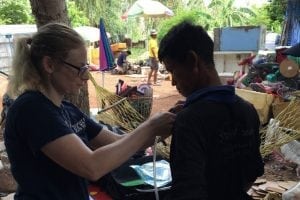
Aubrey Arain attaches an air sampling pump to an e-scrap worker to measure contaminants in the air he breathes.
Researchers from the University of Michigan are studying and finding ways to mitigate health risks from informal electronics recycling practices in Chile and Thailand.
According to a write-up from the university, a team has been working to identify health hazards in the two countries over the past two years. The work is led by Rick Neitzel, associate professor and director of the Exposure Research Lab at the Ann Arbor, Mich. university.
Neitzel and public health and engineering students from the university have collected blood and urine samples from e-scrap workers to test for metals and other contaminants. They have also tested for noise, water and air pollution, and they’ve examined workers’ lung functions.
Their goal is to identify risks and come up with solutions in consultation with the workers.
“Our goal is to help them establish healthier work practices,” Aubrey Arain, a doctoral candidate in environmental health sciences, stated in the write-up. “That might mean moving where you work farther away from where you’re cooking. It might mean keeping pots covered instead of cooking rice right next to where you are working, limiting where children can move in the home.”
Photo courtesy of University of Michigan.
More stories about research
- Project brings rare earth recovery into e-scrap facility
- Texas A&M researches rare earth extraction
- Report: Battery ‘retirement tide’ nears